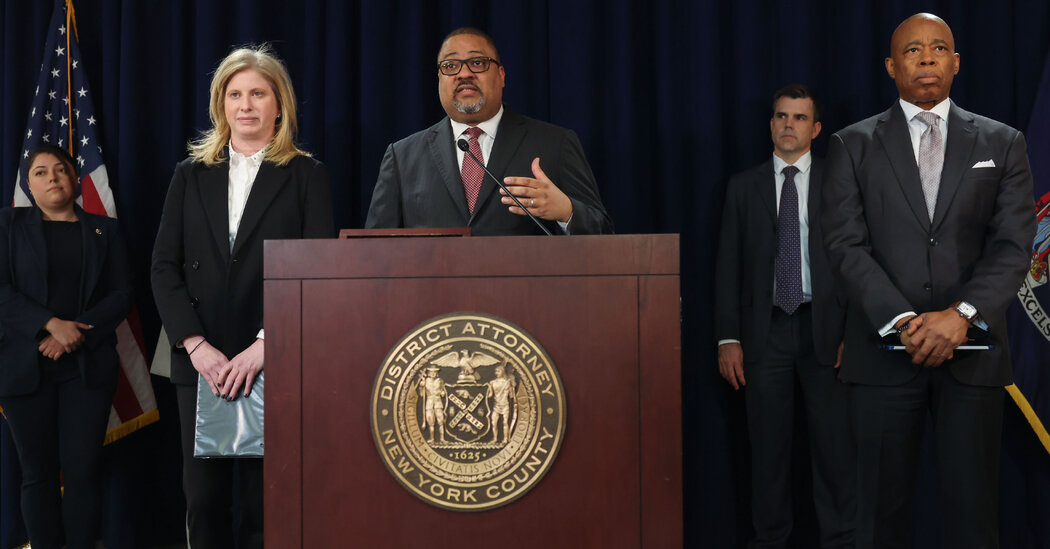In East Harlem, a six-month gang war led to gunfire in playgrounds, buildings, courtyards and crowded streets, accounting for half the shootings in a single police precinct, law enforcement officials said on Tuesday.
The feud between the gangs, known as Wuski and LA World, resulted in 21 shootings, according to Alvin Bragg, the Manhattan district attorney, who on Tuesday announced two indictments against 16 members.
The defendants, 13 of whom were younger than 18 at the time of the shootings, face a litany of charges, including criminal possession of a weapon, attempted murder and conspiracy with the intent to commit murder.
“It is sobering for me to bring such charges — serious charges — against defendants who are so young,” Mr. Bragg said at a news conference on Tuesday.
“This brazen disregard for the lives of others created an atmosphere of terror for any other group going about their daily business,” he added.
The cases put a spotlight on a surge in youth crime, as well as the so-called gang database — a highly contested trove of information about thousands of people whom the police have identified as members of New York City criminal groups.
Since Jan. 1, there has been a 112 percent increase in the number of shooters under the age of 18 compared with the same period in 2018, Michael LiPetri, the chief of crime control strategies at the Police Department, said at a news conference last week. Nearly 20 percent of people who are wanted for or arrested in shootings citywide are under 18.
Most of the violence across East Harlem stemmed from the Johnson Houses, a public housing complex known as Wuski territory; and the Lehman Houses and AK Houses, which constitute the turf of LA World.
The feud began on Second Avenue around 2:30 p.m. on March 22, 2024, when Xavier Roberts, 16, a member of LA World, fired four shots at gang members associated with Wuski, prosecutors said. Around 20 minutes later, he and 25-year-old Harry Mendoza, another member of LA World, exchanged heart and laughing emojis in group text messages with other defendants about the shooting, according to one of the indictments.
Just under 12 hours later, in front of the Moon Rock smoke shop at the corner of East 125th Street and Lexington Avenue, Mr. Roberts fired another four rounds at gang members, striking one person, the indictment said.
Then, on March 24, Mr. Roberts messaged the group chat again to say that their rivals were “suited up and grouped up in Moon rock,” the indictment said.
Half an hour later, Mr. Mendoza and Ashley Ballard, 16, were fatally shot, prosecutors said. None of the defendants named in Tuesday’s indictments were charged with the killings.
Mr. Mendoza’s death set off a war between the gangs. On April 1, 2024, three Wuski members stole a floral wreath from a memorial for Mr. Mendoza at the Lehman Houses, according to the second criminal indictment. Seven days later, Prince Bouche, a Wuski member, sent an audio message to several other defendants, prosecutors said.
“I need every Lehman member to die,” he wrote, according to the indictment. “When we get the one we want we’re going to be good, bro.”
Stopping such conflicts requires information on youths who are members of or affiliated with gangs and crews, according to police officials. The database currently lists the names of 13,304 people, including adults, associated with 507 criminal groups, Joseph Kenny, the chief of detectives, said at the news conference on Tuesday.
Some local lawmakers, public defenders and criminal justice activists have sought to prevent the police from collecting such information. At least 25 City Council members support a bill that would dissolve the database. They contend that no one notifies people who are listed as gang members or affiliates; there is no appeals process to have one’s name removed; and most of the people named are Black or Latino, subjecting those communities to unfair treatment by the police.
But investigating those accused in the East Harlem shootings would have been impossible without the dossiers, said Jessica Tisch, the police commissioner, who also spoke at the news conference.
“This database helped our investigators understand the members of these gangs, and, importantly, their rivalries,” she said. “Calls to get rid of this tool are dangerous. They fly in the face of public safety.”
Commissioner Tisch said that during the police investigation into Wuski and LA World, detectives delved into gang members’ online presence.
The defendants, she said, bragged about the violence on social media and “shared screenshots from the Citizen app when shootings were reported.”
They were “clear about their deadly intentions, and they wanted credit,” she said. “So today, we are more than happy to give it to them.”
